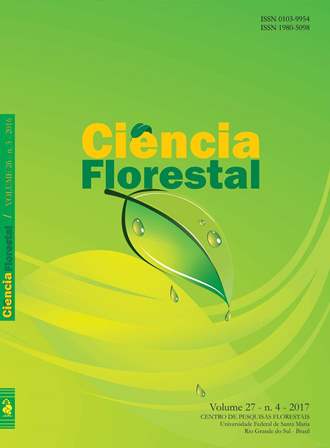ARBUSCULAR MYCORRHIZA AND PHOSPHATE ON GROWTH OF AUSTRALIAN RED CEDAR SEEDLINGS
DOI:
https://doi.org/10.5902/1980509830320Keywords:
mycorrhizal association, phosphorus fertilization, forestry production, inoculation, Toona ciliata M. Roem var. australisAbstract
The Australian red cedar (Toona ciliata M. Roem var. Australis) is a species that has shown potential for forest use in Brazil. Thus, the objective of this study was to test the Australian red cedar seedlings response to inoculation with arbuscular mycorrhizal fungi (AMF) in different doses of P. The experiment was conducted in a Completely Randomized Design (CRD) in factorial 8 x 2, with five repetitions. The treatments consisted in inoculation of seven species of AMF: Rhizophagus clarus, Claroideoglomus etunicatum, Racocetra gregaria, Acaulospora colombiana, Acaulospora morrowiae, Gigaspora margarita and Dentiscutata heterogama, besides a treatment without inoculation; being subjected to two doses of phosphate 25 and 250 mg dm-3 and that levels were equivalent to 10.7 and 41.3 mg dm3, respectively, extracted by Mehlich-1. It was evaluated the percentage of colonization, sporulation, height, diameter, shoot dry matter and accumulation of nutrients, 150 days after transplanting. There were differences depending on the levels of P and isolated variables evaluated. At the lowest dose, the isolated Claroideoglomus etunicatum and Acaulospora colombiana benefit the growth and nutrient absorption, while at the highest dose, Acaulospora morrowiae showed to be more promising for the growth of plants.







